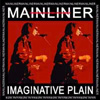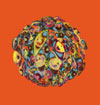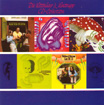|
reviews by
CHRIS MOON

KEMIALLISET
YSTAVAT: Kellari Juniversumi CD (FONAL
RECORDS)
Originating
out of the criminally under-documented Lal Lal Lal scene,
Kemialliset Ystävät's first full length, widely
available release is not simply one of the most essential
things to appear as of late, it is also one of the most
mind-boggling. As if it took 30 years to construct a proper
response to the Faust tapes, Kellari Juniversumi replies
in a similar incomprehensible babble, such that you know
upon really hearing it that a thousand bands shall follow
in its wake.
Yes,
the instrumentation reminds me of Faust, the vast array
of instruments, mostly acoustic with a few electronics;
but the reply to Tapes could never be made by Faust. They
tried that and failed utterly. They just made more Faust.
But Tapes was not about any one band. It was an idea. It
was an entire world of music in microcosm--a microcosm which
deconstructed music to make something absolutely new. It
bounced between almost chaotic exploration, degenerate song
structure, composed yet totally alien pieces, jazz, whatever.
Tapes was really the most brilliant thing Faust ever did,
though I don't know if they ever recognized that. Yet whether
consciously or drawn by something altogether foreign to
consciousness, Kemialliset Ystävät seems to play
with that very knowledge.
The
contents of Kellari Juniversumi are obviously quite varied,
yet let's not kid ourselves. Most of them are so alien that
even the songs that clearly are 'songs' don't sound like
anything you have ever heard before. Sure, it sounds quite
ethnic, but you would be hard pressed to say it belongs
to any one place--especially given the addition of subtle
electronics along side of primitive instrumentation. It
isn't that this sort of thing has never been done before,
but bands such as Atman speak in a language we understand.
There remains a certain safety that I cannot credit to Kellari
Juniversumi; belonging instead to that slender catalog we
might rightly file as 'Terra Incognita'! Yes, this is precisely
why I draw that connection to tapes. Both albums belong
to an unclassifiable, dangerous non-genre that could so
easily launch a thousand other bands. Your first listen
will provide nothing to latch onto. No familiar territory.
This is truly new music while sounding like it could have
been made 40 years ago!
What
really sets Kellari Juniversumi apart from Tapes is that
ALL recognizable structures are gone. There are no rock
songs, no jazz. Most tracks have some resemblance to ethnic
music you might have heard, and some resemblance to the
more primitive (and contagious) elements of Amon Düül
1, yet never sounding like anything except something utterly
new--and that can be, in a way, terrifying. This is definitely
an album to humble anyone who thinks they have heard it
all.
I
have to admit that I've heard very little of the Psychedelic
underground of Finland. If Kellari Juniversumi is any indicator,
we may be seeing the beginning of a new movement no less
important than the Japanese and New Zealand scenes. Perhaps
something to rival the legendary days of Can and Faust?
All I can say is that if you consider yourself in anyway
connected to modern psychedelic music, than there is no
way you can avoid purchasing this album immediately!
MAINLINER:
Imaginative Plain CD (PSF)
 While
Mainliner's new one may not add anything to the identity
of Mainliner (I'm not sure what there would really be to
add anyway), PSF's release is a fantastic rectification
of the near unavailability of Nanjo's legendary band. 'Mellow
Out' and 'Mainliner Sonic' (both on Charnel House) are so
out of print that I could probably sell mine on Ebay for
fistfuls of green. 'Psychedelic Polyhedron' (their third)
released on Fractal Records seems equally out of print,
and short of bootlegs or weird 10 cd-r collections, that
is about it for this 'Psychedelic Solid Free Attack Group'.
A grave misfortune since it seems that any one in the know
should at least own one Mainliner album; they're just as
worthy as High Rise, and in my opinion a good step above
the prog nonsense of La Musica. Thus, moving to PSF seems
a sound move given the label's dedication to keeping its
burgeoning catalog in print. While
Mainliner's new one may not add anything to the identity
of Mainliner (I'm not sure what there would really be to
add anyway), PSF's release is a fantastic rectification
of the near unavailability of Nanjo's legendary band. 'Mellow
Out' and 'Mainliner Sonic' (both on Charnel House) are so
out of print that I could probably sell mine on Ebay for
fistfuls of green. 'Psychedelic Polyhedron' (their third)
released on Fractal Records seems equally out of print,
and short of bootlegs or weird 10 cd-r collections, that
is about it for this 'Psychedelic Solid Free Attack Group'.
A grave misfortune since it seems that any one in the know
should at least own one Mainliner album; they're just as
worthy as High Rise, and in my opinion a good step above
the prog nonsense of La Musica. Thus, moving to PSF seems
a sound move given the label's dedication to keeping its
burgeoning catalog in print.
But
what of the album? Oh hell, half my reason for reviewing
this one is it's a no-brainer! High Rise bumped up half
a dozen notches. Stupid, insane, all in the red, rock and
roll perhaps at its most indulgent. Stylistically it is
somewhere between surf, punk, rock and ground zero atomic
holocaust fun! I'm trying as hard as I can not to make any
drug references here...coz isn't that just too obvious?
For anyone who's heard the threatening din out of the East,
this is hard-core Japanese psych rock; and that isn't psych
as in hippies and flowers. It is psych as in if all the
metal bands had decided to become improv units, turned all
their amps up, and decided to really hurt us with rock and
roll. Is that psychedelic? I'm not going to argue with Nanjo
on this one, because whatever Mainliner is, it clearly isn't
going to change, and Psychedelic is just as good a word
as any.
With
a running time around 35 minutes, it will wrap up just before
you're wrapped up. It is always good when bands know just
how much you can take. Their former releases showed the
same brilliance, and realistically, this is probably the
only Mainliner release you need unless you're collector
scum (join the crowd). As good if not better than 'Mellow
Out', this is an obvious recommendation for anyone who's
tastes exceed what's on the radio. Rock on!
PELT:
Ayahuasca CD (VHF)
 Pelt is one of the survivors from that explosive mid 90's
underground explosion that resulted in Drunken Fish's glorious
Harmony of the Sphere's box, yet Pelt was too radical still
to appear on that lavish collection. At first a seeming
US counterpart to the NZ free noise scene, Pelt quickly
mutated into something altogether different, culminating
in their landmark 'Empty Bell Ringing in the Sky' CD. Empty
Bell is an awe inspiring work of what I would unfortunately
classify as 'drone', when in fact the album defies classification.
Closer in spirit to the incredible Gold Blood release by
Fushitsusha; cacophony melds into higher order consciousness,
or perhaps it is something other than consciousness. Whatever
it is, this is new music; no less innovative than the likes
of Ligeti or Xenakis.
Pelt is one of the survivors from that explosive mid 90's
underground explosion that resulted in Drunken Fish's glorious
Harmony of the Sphere's box, yet Pelt was too radical still
to appear on that lavish collection. At first a seeming
US counterpart to the NZ free noise scene, Pelt quickly
mutated into something altogether different, culminating
in their landmark 'Empty Bell Ringing in the Sky' CD. Empty
Bell is an awe inspiring work of what I would unfortunately
classify as 'drone', when in fact the album defies classification.
Closer in spirit to the incredible Gold Blood release by
Fushitsusha; cacophony melds into higher order consciousness,
or perhaps it is something other than consciousness. Whatever
it is, this is new music; no less innovative than the likes
of Ligeti or Xenakis.
Having climbed
that mountain already, Pelt does not make the mistake of
trying to repeat itself. The masterful Ayahuasca,
while perhaps not the landmark that Empty Bell
was, is nonetheless one of the most satisfying things I've
heard by the band. This time 'round, the 'hillbilly theatre
of eternal music' have indeed broken out their banjos, and
when the band is not exploring uncharted territory, it exploring
an equally interesting Appalachian folk music/Pelt amalgamation.
If you think that Pelt has gone completely native, a quick
listen of The Black Twig Pickers (a Mike Gangloff spin-off
project) will tell you that the Pelt songs here are not
-quite- true to form (even if they are traditional numbers);
though you might have come to the same conclusion given
some of the instrumentation.) This bizarre hybrid of folk,
drone and noise makes for what may be among one of the most
original albums I've heard in years (really, what should
you make of a Fahey-esque number with scraping violins and
tibetan bowls?)
Elsewhere we
hear the Pelt sound we've all come to know, but now with
distinctive eastern-tinged harmonies -- something that softens
the impact of Pelt's normally mind-altering experience,
but next to folk numbers, that is probably a good choice.
At two discs
in length, Ayahuasca has a LOT to offer, and the fact that
it is able to put this length to good use without repetition
says a great deal about what Pelt has to offer. Although
at times I'm not sure whether this is more a collection
of various Pelt tracks or just one incredibly diverse album,
it is nonetheless a very rewarding purchase that easily
justifies the slim price tag ($12 from VHF) even if you've
never heard Pelt before. Go out and buy!
WITTHUSER
& WESTRUPP: Die Ohr CD Collection (ZXY CD)
 When
Julian Cope wrote his field-guide to Krautrock back in the
mid-90's, he couldn't possibly have grasped how much he
turned the meaning of the term into just 'music Julian Cope
likes'. Until books like 'Crack in the Cosmic Egg' and 'Cosmic
Dreams at Play' appeared on the scene, it was (at least
to the uninitiated) as if Krautrock only spanned the experimental
electronic artists, while missing wholly the expansive cosmic
folk musings that were prevalent during the period. There
is no question about it, the Germans were hippies, and if
you've ever found Robbie Basho's singing a bit on the silly
side, there is record upon record of German hippie ramblings
that are no less embarrassing. Of course, you like embarrassing.
You love to hear Robbie Basho sing. I do too. When
Julian Cope wrote his field-guide to Krautrock back in the
mid-90's, he couldn't possibly have grasped how much he
turned the meaning of the term into just 'music Julian Cope
likes'. Until books like 'Crack in the Cosmic Egg' and 'Cosmic
Dreams at Play' appeared on the scene, it was (at least
to the uninitiated) as if Krautrock only spanned the experimental
electronic artists, while missing wholly the expansive cosmic
folk musings that were prevalent during the period. There
is no question about it, the Germans were hippies, and if
you've ever found Robbie Basho's singing a bit on the silly
side, there is record upon record of German hippie ramblings
that are no less embarrassing. Of course, you like embarrassing.
You love to hear Robbie Basho sing. I do too.
The collection
I'm reviewing here was used for $8 at Twisted Village (who
can pass that up?), and given that three of the four albums
sampled here are more or less unavailable, it seemed like
a good buy. Witthuser & Westrupp probably had some minor
mention on the part of Cope as I recall. Their album 'Trips
and Traume' is legendary, merging silly folk tunes with
heavy electronics. It never takes itself too seriously,
and it's actually fun! Most of the great songs from that
album are here (over half the album) including the now famous
cover of 'Don't bogart that joint'. But that isn't the real
treasure here since Trips und Traume is easy to find on
CD. Rather, it's the four other albums collected here, Lieder
von Vampiren, Bauer Plath, Der Jesuspilz and the live set
that really make this a fantastic find, especially in a
used bin!
The tracks from
Lieder von Vampiren, Nonnen und Toten are pleasant enough,
but pretty standard folk numbers. My volume of 'Cosmic Dreams
at Play' writes the experience off completely, but from
the three tracks here, I'd say he's gone too far in calling
the material worthless. But I'll admit that I didn't pick
the CD up for that. Der Jesuspilz and Bauer Path find W&W
in perhaps their most ludicrous form. There may be more
than one mellotron in use here, while choirs of little girls
sing 'la la la' in the background. If Tarot was a MUCH sillier
album, it might have aspired to this material. There is
no doubting that this is prog, but it is also folk, and
it is very German folk. Keyboard solos are interrupted by
quasi-yodeling, and monologues that no doubt pronounce the
secrets of the universe. I doubt the absurdity was intentional,
but this is definitely prog-folk overload, and you're sure
to love it if you can find a copy.
One other bit of praise
I need to sing for this album--the comp itself is 75 minutes
long! Even without the Trips und Traume tracks, it's still
a full length set. Mmm, so yeah, if you're still piecing
together your krautrock collection, this is a nice find.
BOWLING
FOR COLUMBINE (2002, directed by and starring Michael Moore)
 Incidentally,
I don't know how you spoil a documentary, but if you're
worried about that, please don't read any further. That's
all the warning you'll get from me. Incidentally,
I don't know how you spoil a documentary, but if you're
worried about that, please don't read any further. That's
all the warning you'll get from me.
It took over
12 years for Moore to achieve what he probably set out to
do with Roger and me, but clearly those years were not wasted
as Bowling for Columbine is quite easily identifiable as
Moore's masterpiece. That being said, it is still a flawed
work, filled with inaccuracies, and often as manipulative
as the propaganda it attempts to lampoon. The upside is
that Moore's agenda is a much more palatable one than his
antagonists', yet when the film is speculated upon, one
wonders if the 'to beat your enemy, become your enemy' is
really the best way to go about doing things.
Bowling for Columbine
is at first glance a film about the violence committed at
the Columbine school, yet this is just a bouncing board
for Moore (and really only a paper thin disguise). What
seems to be the most likely motivation is another school
killing--one that happened in Moore's hometown. Yet even
between both events, Moore spends little time on them. Instead,
the film deals with the issue of violence in the US. Not
violence at school, not violence by kids--and indeed, not
even really gun centered violence. Moore strays to dealing
with our violent foreign policy, pointing a finger at US
weapon arms companies. Yes, Moore is concerned with the
big picture.
Where Bowling for Columbine
is a real success for Moore over his previous film Roger
and Me is that here he is able to construct a major thesis
for the film, namely, that our violence does not stem from
guns, movies, video games or music, but rather, from a media
that promotes fear and paranoia. Moore exposes that Canadians
have a love for guns that exceeds our own, yet deaths by
gunshot is just a fraction of the number in the US. Similarly,
those aspects of our culture that we've been using as scapegoat
are equally idolized by Canadian youth. The difference between
us and Canada (and Europe and Japan for that matter), seems
to lie in the media, at least that's what Moore concludes
in Bowling for Columbine.
Ironically, it doesn't stop
him from harassing K-mart for carrying bullets (the killers
in the Columbine shooting purchased their bullets there),
nor from even paying a visit to Charlton Heston and giving
the old fellow a hard time. Sure, it's an idiosyncratic
film, but its execution is convincing and always entertaining.
As usual, Moore catches people on film saying things you
think they'd never reveal. And as usual, he is first to
throw himself into unusual positions--asking absurd questions
to all the wrong people.
There is no mystery that
where Moore succeeds most is as an entertainer. Although
his interview with the producer of Cops may reveal little
more than the pre-calculated popularity of the program,
Moore's interspersed segments of his invented show 'Corporate
Cops' is perhaps one of the funniest things I've seen in
years. Other attempts, however, like the interview of a
small town militia may try to poke fun at these rural sharp
shooters, but in the end, it really doesn't entertain and
adds nothing to Moore's premise. And while a segment by
South Park creators about white man's inherent fear of everything
is funny, its factual inaccuracies make you wonder if all
this humor isn't at the expense of the integrity of Moore's
narrative.
In the end, Bowling for Columbine
manages to be just shy of fantastic. It is wildly entertaining
and its points are provocative and insightful. Many of the
issues dealt with are extremely emotional; which Moore expertly
balances out with a good sense of humor. I would draw comparisons
to the humorously constructed Atomic Cafe documentary.
All in all, this is an important film that anyone with an
open mind should go see (yes, republicans too!) but don't
be surprised to find Moore's actions occasionally repellant,
and his wisdom to often be little more than diatribe.
|

